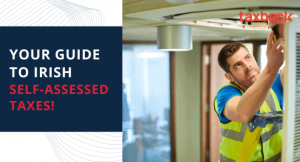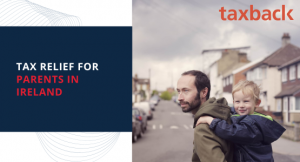How do I declare rental income in Ireland as a non-resident landlord?
We’ve answered 15 of the most common non-resident landlord tax frequently asked questions!
If you are residing abroad and earning rental income in Ireland, you must file a tax return and declare your income to Revenue. There are also specific rules you must follow when collecting rent from your tenants.
So how can you ensure you are fully tax-compliant in Ireland and claim all of your tax entitlements?
If you have some queries regarding your Irish tax responsibilities you have come to the right place! Here, in this guide, we’re going to answer some of the most commonly asked questions we receive from overseas landlords each day.
We’ll discuss the steps involved in filing a tax return, claiming tax expenses, how to appoint a rent collection agent and much more.
Please note that while corporate property owners are also required to pay tax in Ireland, the content in this article will be particularly relevant to individual landlords.
1. Is rental income taxable in Ireland? And if so, how much tax do non-resident landlords pay in Ireland?
Income tax
Do you pay tax on your rental income in Ireland?
If the answer to that question is ‘no’, you may run into some difficulties with the Irish tax authorities!
In short, if you earn income from a rental property in Ireland you must pay tax.
Exactly how much income tax you will be required to pay will depend on your personal circumstances. For example, there are different tax rates for corporates and individual property investors.
As an individual landlord, the first €42,000 of your earnings will be taxable at 20%. Meanwhile, the balance will be taxed at 40%.
USC
If you earn more than €13,000 in Irish rental income, as a non-resident landlord, you are liable to pay USC.
| Standart rate of USC | 2024 |
|---|---|
| First €12,012 | 0.5% |
| €12,012 - €25,760 | 2% |
| €25,760.01 - €70,044 | 4% |
| Anything above €70,044.01 | 8% |
PRSI
As a non-resident property owner, you will not be subject to Pay Related Social Insurance (PRSI), except if you let your property through booking sites such as Airbnb. In this case, your rental profit will be liable to PRSI.
PRSI, charged at 4%, is a tax paid for the Irish social insurance fund.
PRSI is typically chargeable against rental income.
However, only resident landlords are required to deduct PRSI.

Capital Gains Tax - CGT
If you sell a property in Ireland for a profit, you will be required to pay Capital Gains Tax (CGT).
The current rate of CGT is 33% and annual gains of up to €1,270 are exempt from CGT.
There are a number of reliefs that can minimise your CGT liability.
Local Property Tax - LPT
Every owner of Irish property is required to pay Local Property Tax (LPT for short).
And regardless of whether you live in Ireland or abroad, you must still pay LPT.
Exactly how much LPT you will be charged will depend on your property’s value. The general LPT rate is currently 0.18% for properties valued under €1 million and 0.25% on the amount of the value over €1 million.
The liability date for LPT is 1 November each year - this means that your property is liable for LPT for 2024 if it's a residential property on 1 November 2023.
2. How much tax do non-resident corporate landlords in Ireland pay on their rental properties?
Non-resident company landlords are subject to Irish corporation tax at the rate of 25% on rental income from Irish property.
3. How much rent can you collect without paying tax?
You should report your rental income to Revenue for tax assessment – regardless of how much income you earn.
Some Irish resident landlords are entitled to earn up to €14,000 in rental income tax-free (this is known as Rent-a-Room relief). However, in order to qualify for this relief, you must be letting a room in your sole or main residence.
As an overseas landlord, it is unlikely you will be able to qualify for this type of tax relief.
4. Is Airbnb income taxable in Ireland?
While Airbnb income is not necessarily considered ‘rent’ per se, it is still taxable in Ireland.
So, even if the income you earn from your property is generated exclusively through short-term lettings, you must still declare your rental income for self-assessment tax.

5. Am I required to file a tax return in Ireland? How do I declare rental income in Ireland?
You will need to file tax documents in order to declare your non-resident landlord rental income with Revenue.
The exact form you will be required to file will depend on your individual circumstances.
Revenue will consider you to be a ‘chargeable person’ for self-assessed tax purposes if:
- Your total Gross non-PAYE income is in excess of €30,000
- Your net assessable income is in excess of €5,000
Or
- You have non-PAYE income less than €5,000 and do not have it coded into your tax credit certificate
So, if your net rental income is over €5,000, you will have to register for self-assessment and file Form 11 with Revenue.
Meanwhile, if you earned less than €5,000 outside the PAYE system and coded in your tax credit certificate (including income from your rental property) you should file a Form 12.
6. When is my rental income tax return due? And what happens if I miss the deadline and do not declare my rental income?
The deadline to file your tax return and declare income earned as a non-resident landlord is 31 October.
Although, if you file online, the deadline is extended to mid-November.
If you do not file your tax return or pay tax on your rental income, you will likely incur late-filing fines and penalties from Revenue.
7. What can I deduct from my Irish rental income in order to reduce my tax bill?
There are a number of expenses that non resident landlords can claim in order to lessen a rental income tax bill.
Although, it should be noted that, only expenses that are in relation to the management of the premises can be offset against your taxable income.
In other words, if you partly rent out the property, you can only claim the portion of the expenses related to the amount of the property that is let.
Amongst the allowable expenses are:
PRTB Registration
Every landlord must register their rental property with the Private Residential Tenancies Board (unless certain exceptions apply). You can include the full amount for both the initial fee and the sum you paid per tenant as a deduction on your tax return (provided you haven't incurred any penalties for late registration).
Repairs and Maintenance/Wear and Tear
These essentially cover the cost of maintaining your property to a liveable standard for your tenants.
Repairs and Maintenance covers the cost of fixing broken windows/locks, servicing boilers etc., whereas Wear and Tear is a deduction for the price of furnishings and fittings if you've pre-furnished your property for tenants. The wear and tear allowance is given at 12.5% over 8 years.

Legal/Accounting Fees
If you've paid a professional to provide you with any legal or accounting services relating to your property (for example, to have leases drawn up, or to prepare rental accounts) this can be included as a tax deduction.
Insurance Premiums
Insurance policy premiums relating to your rental property can also be claimed back on a tax return. This includes premiums paid on Mortgage Protection Policies.
Advertising Expenses and Estate Agent Fees
Anything you pay towards publicising or advertising your property for rent is fully claimable.
Management/Agent Fees
If you use an intermediary to collect rent on your behalf or deal with tenants, this service is tax-deductible.
Local Service Charges
The cost of rubbish collection, recycling, or making any other payments relating to services provided to your rental property by the local council are all allowable as a tax deduction.
Pre-letting expenses
It’s important to tread carefully here.
If you're renting out property, repairs or alterations taken out when the property is not under a lease are not tax deductible. Also, if you're renovating a property in preparation for tenancy, those expenses are not deductible.
However, there are some exceptions to this rule.
It is possible to include pre-letting expenses on your tax return if:
- You’re letting out the property for the first time
- The expenses incurred on a vacant residential property within the 12 months prior to the first letting (the deduction is capped at €5,000)
What do non-resident landlords need to know about new tax rules introduced in Ireland?
In Budget 2024, the government announced a temporary tax relief for landlords. This relief will be available against some rental income at the standard rate of 20% each year from 2024 to 2027. To be eligible for this relief, the landlord must keep their property in the rental market for the duration of the four years.
This relief will reduce the tax paid on rental income from €600 up to €1,000.
Eligible landlords can claim 20% of:
- €3,000 in 2024
- €4,000 in 2025
- €5,000 in 2026 and 2027
In Budget 2023, the government doubled the tax deduction for pre-letting expenses on vacant residential properties to €10,000. And the period of time a property must have been vacant to claim these expenses has been reduced from 12 months to six months.
The government also announced that a vacant home tax would be introduced and charged where properties had been occupied for less than 30 days in a 12-month period.
Can I claim a tax deduction for a new kitchen or bathroom on a rental property?
Potentially.
In short, you are entitled to claim 12.5% per annum over 8 years for the cost of qualifying assets that you purchase for your rental property.
Qualifying assets can include new furniture for the house or a new kitchen or bathroom.
8. What expenses are not allowed?
Not every property-related expense is applicable as a tax deduction.
For example, you cannot deduct the following expenses when you are calculating your rental profit or loss:
- Pre-letting expenses (other than those listed above)
- Expenses on premises rented out on an uneconomic basis, where it is not possible to make a profit from the rent received
- Interest from the time you buy the property up until it is first rented out
- Local Property Tax (LPT)
- Cost for your own labour when carrying out repairs to the property

9. Should I keep any documents related to my property expenses?
Yes. Like all landlords, non-resident property owners can also be selected by Revenue for audit.
With that in mind, it’s important to keep all relevant receipts and invoices related to each expense safe. You’ll need to keep these documents for up to six years.
10. If I sold my rental property last year, do I still need to complete a landlord tax return? And what if my rental property is being let at a loss?
In the year following the sale of your rental property, you do not have to file an income tax return (provided you have no other non-PAYE income from any source). Please note that you may, however, be liable to pay Capital Gains Tax.
Meanwhile, if you are making a loss from your property, you will not have a tax liability on rent received.
What’s more, losses can be carried forward and deducted from profits made in future years.
However, if you make a profit for a particular tax year, you are obliged to file a tax return with Revenue and declare your income.
11. How should non-resident landlords collect rent from tenants?
When a tenant rents a property which is owned by an overseas landlord, they are obliged to withhold 20% of the gross rental income and pay this amount to Revenue. They must then issue a Form R185 to their landlord. This document is evidence of the tax withheld and paid.
Alternatively, non-resident landlords can opt to appoint an Irish rent collection agent to manage these responsibilities.
12. Do non-resident landlords need an Irish rent collection agent?
Overseas property owners do not necessarily need to appoint a rent collection agent in Ireland.
However, by enlisting the services of a professional, you can have peace of mind that your tax requirements are being managed in full compliance with the Irish tax authorities.
13. How can I appoint a rent collection agency in Ireland?
With more than 25 years of experience in Irish taxes, Taxback has launched Rentax – our rent collection agent service for non-resident landlords.
By nominating Taxback as your Rent Collection Agent, our team will ensure your tax withholding obligations are met and that you are fully tax compliant in Ireland.
We will also assist in preparing and filing your end-of-year income tax return.
How does the Rentax service work?
When you choose Rentax, Taxback will be issued with a separate PPS number for Collection Agent activity and will file an annual tax return with Revenue on your behalf.
14. Where do I send my agent link notification?
Should you choose to enlist the support of a tax agent, it’s important that you inform Revenue.
To do this, you must complete an agent link notification and send it to Revenue. You must include your Tax Reference Number and your tax agent’s Tax Advisor Identification Number (TAIN) on the notification.
Rentax can manage this on your behalf. Learn more here.
15. What percentage does a rent collection agency take?
Taxback charges a once-off fee of €100 for registration as your collection agent and a fee of €338 to cover the preparation and filing of your annual tax return.
An additional €30 monthly administration fee (deducted from any rent payment received) may be due where Rentax is collecting the rent on your behalf.
What are the benefits of choosing Rentax?
At Taxback, we understand Irish tax law so that you don’t have to.
Our expert team will guide you through your Irish tax responsibilities and even support you in filing your self-assessed tax return – minimising your tax bill in the process.
Why Rentax?
- Registered rent collection agent for non-resident landlords
- Managing tax withholdings on monthly rental income
- Filing of annual self-assessed income tax returns
Where can I learn more about Rentax?
To learn more about our Irish rent collection agency service, check out Rentax.ie




